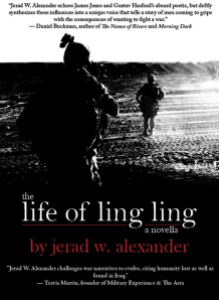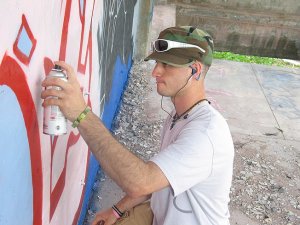Book Review: The Life of Ling Ling, by Jerad Alexander
Fans of Military Experience and the Arts,

We are proud to inform you of the release of Jerad W. Alexander’s first novella, The Life of Ling Ling.
Alexander is a writer and the Associate Editor of The Blue Falcon: A Journal of Military Fiction and editor-at-large for The Journal of Military Experience. From 1998-2006 he served as a U.S. Marine infantryman and combat correspondent with deployments to the Mediterranean, the Horn of Africa, and Iraq. He currently lives in Atlanta, Georgia.
The Life of Ling Ling is an”MEA Sponsored Publication,” a work of substantial length–a novella or short memoir–that receives editorial, production, and promotional assistance from the staff of Military Experience and the Arts. MEA Sponsored Publications represent the mission of “bridging the gap between military and civilian cultures through creative expression and scholarship” and all rights revert to the author upon publication. Authors selected for MEA sponsorship agree to support our mission by donating a portion of their proceeds to our publication and symposium efforts or, in the case of Alexander, by mentoring the works of fellow veteran authors and editorial service with Blue Falcon.
Alexander’s novella tells the story of one Marine’s choice to forgo his humanity and the shocking event that thrusts it back upon him in the form of a little Iraqi girl. Iraq War veteran Jerad W. Alexander proposes absurdity as the vantage point of postmodern troops at war and obscenity as the loudspeaker through which they must speak. The author’s writing reflects this reality, chiefly, through the appropriation of cultural fragmentation—a blowup doll named “Backdoor Beauty,” contraband airline liquor, cruising college bars, and the precise deployment of music, films, colloquialisms and references to life during the first half of the Iraq War—as a means of bringing together Marines and those of the same generation, teaching them war’s hard truths: the intermingling of gear, bodies, and blood at the epicenter of an IED blast, the discovery of one’s “true purpose” in a battle with an enemy sniper, and “grimy apparitions of someone else climbing up [a] wife’s leg.”
Alexander’s protagonist, a Marine named Sergeant Square, mirrors the desolate dogs he and his platoonmates meet near the Euphrates: “A product of its environment … mad, a companion turned mean and vindictive, protecting some feeble idea of personal space, futilely avenging some supposed wrong.” And he asks the uninitiated to relate with this mindset through the glamor and bravado of youth only to turn the tables and interrogates them through Square’s wife, Crystal, who becomes a disillusioned military spouse and disappears with her husband’s money.
As Backdoor Beauty earns her salt and Square accumulates an equally abrasive amount of sand in his crevices, they, like the dogs, change into something else: Backdoor Beauty is christened “Ling Ling” while Square gambles with his life, questions authority, and becomes something “more serious, deadly,” a leader who discards “hollow” memories of home and embraces war without realizing the futility of his efforts. When Square and his platoonmates stumble upon an Iraqi atrocity so profane that even battle-hardened, deadly Marines can’t stomach it, he is forced to see through the false dichotomy of the initiated and the uninitiated, realizing the inextricability of his own humanity.
The Life of Ling Ling is suitable for pleasure reading, scholarship, or classroom instruction. It is available on Amazon Kindle for $2.99 here:
http://www.amazon.com/The-Life-Ling-ebook/dp/B00CU4JOWY/ref=pd_rhf_gw_p_t_1_CBQB
For those without readers, you can read it on your PC or Mac with this app:
http://www.amazon.com/gp/feature.html?ie=UTF8&docId=1000493771
Excerpt:
“Sergeant Square bought a blow-up doll. It was called the “Backdoor Beauty” and it cost $49.99 plus shipping. He did it impulsively, for sheer amusement, and openly admitted to himself that he would have had neither the time nor inclination to look for it at all if only his wife had been home to take his call. He was completely comfortable with that excuse.”
We hope you enjoy Alexander’s work. This ebook is the first of many MEA Sponsored Publications that we hope to deliver to the masses. By helping talented authors like Jerad W. Alexander, we hope to break down barriers to publication and storytelling, enabling veterans of all generations to be heard. Thank you for your continued support of Military Experience and the Arts and the creative endeavors of our contributors and staff members.
Cordially,
MEA President







 Dominic is continuing to work as a practicing artist. Since the Arts and the Military/AMH week he has created murals in Chicago and in Santa Barbara — the first for the National Veterans Art Museum and the second for the University of California at Santa Barbara.
Dominic is continuing to work as a practicing artist. Since the Arts and the Military/AMH week he has created murals in Chicago and in Santa Barbara — the first for the National Veterans Art Museum and the second for the University of California at Santa Barbara.
